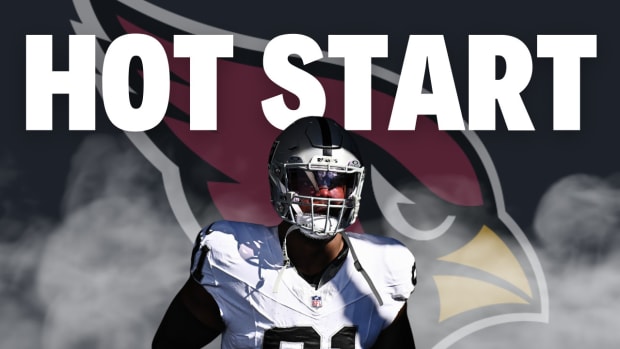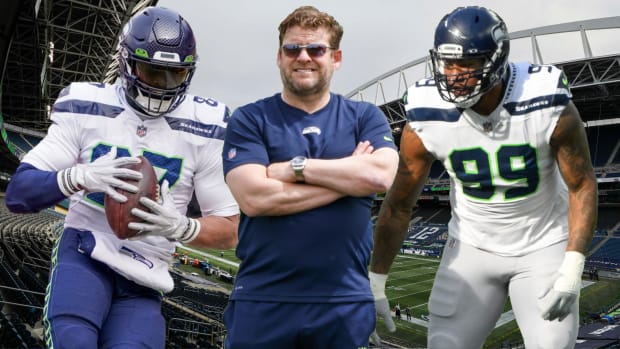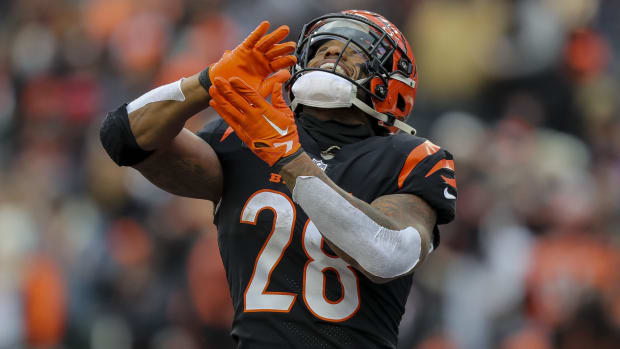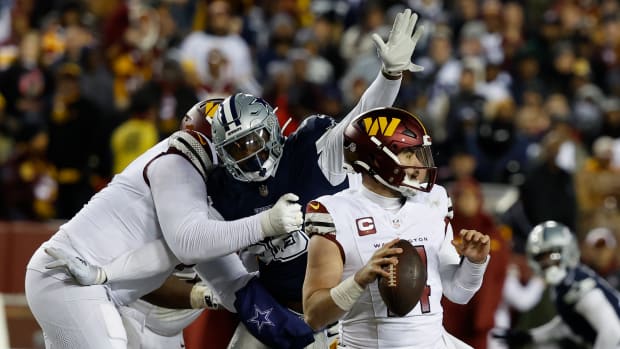Irvin goes from question mark to key starter for Seattle
RENTON, Wash. (AP) Every now and then, even during games sometimes, Bruce Irvin will be overwhelmed by gratitude.
He'll remember the two weeks he spent in an Atlanta jail as a teenager. He'll think about turning his life around and becoming a junior college football standout, only to lack the money to continue in school.
And, of course, Irvin will remember all the criticism that was directed toward the Seattle Seahawks when they decided to make him the No. 15 pick of the 2012 draft.
''Sometimes I'll be in a game during a timeout break looking at the crowd and think, `Dang, a lot of people said I wouldn't be here.' Sometimes I thought about myself I wouldn't be more than what I was,'' Irvin said. ''It's a blessing. I thank God every day. ... Lord knows I was supposed to be in jail or dead. Just for me to be able to practice every day and come out here and watch film is a blessing. I try and make the most of letting the guys know it ain't guaranteed.''
Once considered to be a risky draft choice who could only be a pass rusher in the NFL, Irvin has developed into an every down linebacker who rarely leaves the field. On first and second downs, Irvin is a strongside linebacker who plays on the line of scrimmage.
During passing situations, Irvin gets to put his hand on the ground and do his favorite thing in football, rush the quarterback.
It's a scenario that works for the Seahawks and one no one could have anticipated when Irvin entered the NFL.
''It makes me happy. That was the biggest knock on me that I was situational and I couldn't play the run,'' Irvin said. ''These coaches, Pete (Carroll) and (general manager) John (Schneider), they never wavered, they never pulled the plug on me and they kept believing in me. ... I can't ask for a better supporting cast and a better situation than the one I'm in right now. I just have to continue to keep getting better and not let those guys down.''
Irvin is at the end of his third season, but early in Year 2 his future seemed in question. He had played mostly as an undersized pass-rushing defensive end his rookie season and while he was successful at getting to the quarterback, he also got pushed around in run defense. Seattle's coaches wanted to keep it simple for him at first and not push him to learn multiple positions.
''When we went after him, we thought he would be a very special pass rusher because of his terrific speed,'' Carroll said. ''We thought he would have the ability to do other things beyond that and in time, it took us a little while, we tried to make it easy for him at first and left him at the Leo spot. As we grew with him, we expanded with him.''
Seattle started transitioning Irvin to linebacker at the start of his second season. He was suspended four games for using performance-enhancing substances, but Seattle stuck with its plan. The Seahawks were convinced their best defensive alignment was with K.J. Wright at weakside linebacker and Irvin as their future on the strongside.
Irvin believes that if he was with any other team, he'd still just be a situational player.
Irvin is far from a finished product as a linebacker, but he's managed to retain his pass-rush ability. Irvin finished second in the regular season with seven sacks for Seattle, and he'll likely be getting plenty of opportunities to try to get to Tom Brady against New England in the Super Bowl. When the teams played during the 2012 season in Seattle, the Patriots put the ball in the air 58 times, although their run game is more consistent now.
''Ken Norton Jr., making the decision to make me a linebacker, that probably saved my career,'' Irvin said. ''I always would have been an undersized defensive end. I would rather be a big linebacker than a small defensive end. I think the transition was smart.''
---
AP NFL website: www.pro32.ap.org and http://twitter.com/ap-nfl




































